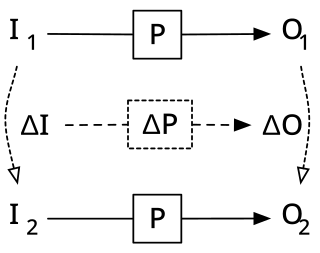Related Research Articles
In computer science, functional programming is a programming paradigm where programs are constructed by applying and composing functions. It is a declarative programming paradigm in which function definitions are trees of expressions that map values to other values, rather than a sequence of imperative statements which update the running state of the program.
SIGPLAN is the Association for Computing Machinery's Special Interest Group on programming languages.
Lennart Augustsson is a Swedish computer scientist. He was formerly a lecturer at the Computing Science Department at Chalmers University of Technology. His research field is functional programming and implementations of functional programming languages.

Matthias Felleisen is a German-American computer science professor and author. He grew up in Germany and immigrated to the US in his twenties. He received his PhD from Indiana University under the direction of Daniel P. Friedman.
Brent Hailpern is a computer scientist retired from IBM Research. His research work focused on programming languages, software engineering, and concurrency.

Programming language theory (PLT) is a branch of computer science that deals with the design, implementation, analysis, characterization, and classification of formal languages known as programming languages. Programming language theory is closely related to other fields including mathematics, software engineering, and linguistics. There are a number of academic conferences and journals in the area.
In computing, a meta-circular evaluator (MCE) or meta-circular interpreter (MCI) is an interpreter which defines each feature of the interpreted language using a similar facility of the interpreter's host language. For example, interpreting a lambda application may be implemented using function application. Meta-circular evaluation is most prominent in the context of Lisp. A self-interpreter is a meta-circular interpreter where the interpreted language is nearly identical to the host language; the two terms are often used synonymously.
In functional programming, a generalized algebraic data type is a generalization of parametric algebraic data types.
The annual ACM SIGPLAN-SIGACT Symposium on Principles of Programming Languages (POPL) is an academic conference in the field of computer science, with focus on fundamental principles in the design, definition, analysis, and implementation of programming languages, programming systems, and programming interfaces. The venue is jointly sponsored by two Special Interest Groups of the Association for Computing Machinery: SIGPLAN and SIGACT.

Incremental computing, also known as incremental computation, is a software feature which, whenever a piece of data changes, attempts to save time by only recomputing those outputs which depend on the changed data. When incremental computing is successful, it can be significantly faster than computing new outputs naively. For example, a spreadsheet software package might use incremental computation in its recalculation feature, to update only those cells containing formulas which depend on the changed cells.
In computer science, region-based memory management is a type of memory management in which each allocated object is assigned to a region. A region, also called a zone, arena, area, or memory context, is a collection of allocated objects that can be efficiently reallocated or deallocated all at once. Like stack allocation, regions facilitate allocation and deallocation of memory with low overhead; but they are more flexible, allowing objects to live longer than the stack frame in which they were allocated. In typical implementations, all objects in a region are allocated in a single contiguous range of memory addresses, similarly to how stack frames are typically allocated.
Conor McBride is a Reader in the department of Computer and Information Sciences at the University of Strathclyde. In 1999, he completed a Doctor of Philosophy (Ph.D.) in Dependently Typed Functional Programs and their Proofs at the University of Edinburgh for his work in type theory. He formerly worked at Durham University and briefly at Royal Holloway, University of London before joining the academic staff at the University of Strathclyde.

F* is a functional programming language inspired by ML and aimed at program verification. Its type system includes dependent types, monadic effects, and refinement types. This allows expressing precise specifications for programs, including functional correctness and security properties. The F* type-checker aims to prove that programs meet their specifications using a combination of SMT solving and manual proofs. Programs written in F* can be translated to OCaml, F#, and C for execution. Previous versions of F* could also be translated to JavaScript.

Kathleen Shanahan Fisher is an American computer scientist who specializes in programming languages and their implementation.

ACM SIGOPS is the Association for Computing Machinery's Special Interest Group on Operating Systems, an international community of students, faculty, researchers, and practitioners associated with research and development related to operating systems. The organization sponsors international conferences related to computer systems, operating systems, computer architectures, distributed computing, and virtual environments. In addition, the organization offers multiple awards recognizing outstanding participants in the field, including the Dennis M. Ritchie Doctoral Dissertation Award, in honor of Dennis Ritchie, co-creator of the C programming language and Unix operating system.
Multitier programming is a programming paradigm for distributed software, which typically follows a multitier architecture, physically separating different functional aspects of the software into different tiers. Multitier programming allows functionalities that span multiple of such tiers to be developed in a single compilation unit using a single programming language. Without multitier programming, tiers are developed using different languages, e.g., JavaScript for the Web client, PHP for the Web server and SQL for the database. Multitier programming is often integrated into general-purpose languages by extending them with support for distribution.
Simon Thompson is a research computer scientist, author, and an emeritus professor of the University of Kent, there specializing in logic and computation. His research into functional programming covers software verification and validation, programming tool-building, and software testing for the functional programming languages Erlang, Haskell, and OCaml. He is the author of books on data type theory, Miranda, Haskell, and Erlang, and runs a massive open online course (MOOC) about Erlang for FutureLearn.
References
- ↑ "The ACM SIGPLAN International Conference on Functional Programming".
- ↑ ICFP Steering Committee (2019). "The Functioning of ICFP" (PDF).